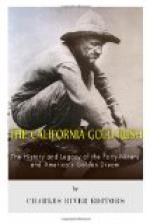The leaders of the Law and Order party chose as their military commander William Tecumseh Sherman, whose professional ability and integrity in later life are unquestioned, but whose military genius was equaled only by his extreme inability to remember facts. When writing his Memoirs, the General evidently forgot that original documents existed or that statements concerning historical events can often be checked up. A mere mob is irresponsible and anonymous. But it was not a mob with whom Sherman was faced, for, as a final satisfaction to the legal-minded, the men of the Vigilance Committee had put down their names on record as responsible for this movement, and it is upon contemporary record that the story of these eventful days must rely for its details.
CHAPTER XIV
THE STORM BREAKS
The Governor of the State at this time was J. Neely Johnson, a politician whose merits and demerits were both so slight that he would long since have been forgotten were it not for the fact that he occupied office during this excitement. His whole life heretofore had been one of trimming. He had made his way by this method, and he gained the Governor’s chair by yielding to the opinion of others. He took his color and his temporary belief from those with whom he happened to be. His judgment often stuck at trifles, and his opinions were quickly heated but as quickly cooled. The added fact that his private morals were not above criticism gave men an added hold over him.
On receipt of the request for the state militia by the law party, but not by the proper authorities. Governor Johnson hurried down from Sacramento to San Francisco. Immediately on arriving in the city he sent word to Coleman requesting an interview. Coleman at once visited him at his hotel. Johnson apparently made every effort to appear amiable and conciliatory. In answer to all questions Coleman replied:
“We want peace, and if possible without a struggle.”
“It is all very well,” said Johnson, “to talk about peace with an army of insurrection newly raised. But what is it you actually wish to accomplish?”
“The law is crippled,” replied Coleman. “We want merely to accomplish what the crippled law should do but cannot. This done, we will gladly retire. Now you have been asked by the mayor and certain others to bring out the militia and crush this movement. I assure you it cannot be done, and, if you attempt it, it will cause you and us great trouble. Do as Governor McDougal did in ’51. See in this movement what he saw in that—a local movement for a local reform in which the State is not concerned. We are not a mob. We demand no overthrow of institutions. We ask not a single court to adjourn. We ask not a single officer to vacate his position. We demand only the enforcement of the law which we have made.”
This expression of intention, with a little elaboration and argument, fired Johnson to enthusiasm. He gave his full support, unofficially of course, to the movement.




